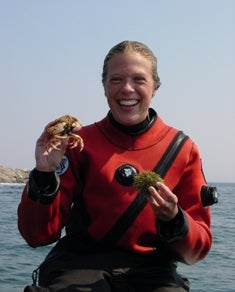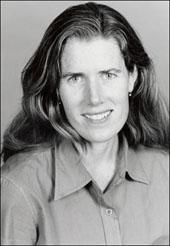
Amanda Leland, EDF Oceans Program - National Policy Director
The National Oceanic and Atmospheric Administration (NOAA) today released a responsible policy to “encourage well-designed catch share programs to help maintain or rebuild fisheries, and sustain fishermen, communities and vibrant working waterfronts, including the cultural and resource access traditions that have been part of this country since its founding.” EDF applauds this policy because it will restore fisheries and improve fishermen’s lives and livelihoods.
For too long the government has propped up a failed system of ocean fishery management. Conventional management has resulted in shrinking fishing seasons, fishery closures, and increased waste. Fishermen are faced with burdensome and ineffective regulations. Because of this today’s fishing jobs are dangerous, part-time, and relatively unstable1, and more than 60 federal fish stocks are classified as overfished or undergoing overfishing. Rebuilt fisheries could increase the dockside value of commercially-caught fish by $2.2B (54% above current value) in the US2.
Catch shares management is the right approach because it improves the conservation of the fishery, drives economic growth, and empowers fishermen to have stable, profitable businesses. Unlike conventional management, which manages the details of how fishermen conduct their business, catch shares provide fishermen with flexibility — allowing them to be more targeted and efficient. This means overfishing ends, wasteful bycatch declines, and revenues increase. Jobs under well-designed catch shares tend to be full-time, higher-paying, safer and more secure over the short and long terms3.
NOAA views catch share programs as “powerful tools to manage fisheries sustainably and improve their economic performance.” Catch shares help shift ocean fisheries from an economic drain to a driver of growth and prosperity. The policy has been in effect in a draft form since December 2009. Changes to the final policy reflect the thousands of comments received since the draft was released.
The policy is focused on providing support, leadership and resources to fishery management councils, fishermen, and other interested stakeholders in order to maximize the effectiveness, flexibility, and application of catch shares. Specifically the policy will:
- Reduce technical and administrative impediments to catch shares,
- Provide expertise and related support to assist the development of new catch share programs,
- Inform and educate stakeholders of the different options and capabilities of catch share programs, and
- Coordinate data collection, research and performance of catch shares.
It’s important to note that the policy does not mandate that fisheries adopt catch shares. Rather, the policy states that ‘[c]ouncils should consider the appropriateness of catch share programs and decide which, if any, sectors may benefit from their use.”
Fishermen might be interested in the following aspects of the policy in particular:
- Transition support: NOAA has demonstrated leadership in providing support to help fishermen through the transition as fisheries recover biologically and economically under catch shares. The policy highlights this point. In addition, NOAA and the National Fish and Wildlife Foundation recently announced an Innovation Fund to help build capacity in catch share fisheries and communities. NOAA’s request to Congress for $54 million for Fiscal Year 2011 appropriations includes funding to help fishermen in the New England and Pacific groundfish fisheries cover costs of new catch share programs.
- Other resources: The policy also encourages fishermen and communities to work with NOAA in gaining access to additional resources of the Department of Commerce including the Economic Development Agency and the Small Business Administration.
- Fishery management for recreational fishermen: The policy includes some important guidance and options forward related to recreational fisheries management, both for private anglers and for charter/for-hire fishermen. This includes encouragement that fishery councils periodically revisit the underlying allocation of fish to each sector, regardless of whether a sector of a fishery is under a catch share or not.
The policy highlights that NOAA “will support Councils in the identification and application of innovative management measures that both promote individual recreational angler fishing access and foster sustainable communities,” but the agency doesn’t advocate the use of catch shares for individual private anglers.
The policy promotes the important role of the charter boat/for-hire sector to the U.S. economy and recreational access. Some charter/for-hire captains have expressed interest in developing a catch share program for their sector of the fishery. NOAA will work with the interested councils and charter fishermen interested in developing pilot catch share programs.
Catch shares work for fishermen and fish populations because they include science-based annual catch limits, accountability measures to ensure compliance with those limits, and effective enforcement. At the same time, catch shares give fishermen greater flexibility for how to run their businesses which improves economic performance.
Catch shares are not a one-size-fits-all management system. They can be designed to fit the needs of individual fisheries, which sets them apart from conventional management. Catch shares have been implemented in about 275 fisheries around the world from New Zealand to Namibia to Norway, in fisheries large and small. There are now 25 catch share programs in the U.S. and more are under development.
1 Redstone Strategy Group, LLC. 2007. Assessing the potential for LAPPs in U.S. fisheries. Report prepared for Environmental Defense, 41 pp., Washington, DC.
2 NOAA. National Catch Share Policy. 2010.
3 Redstone Strategy Group, LLC. 2007. Assessing the potential for LAPPs in U.S. fisheries. Report prepared for Environmental Defense, 41 pp., Washington, DC.
 In a long-awaited decision, the 1st U.S. Circuit Court of Appeals has upheld a 2011 lower court ruling confirming the legality of the NE sector program.
In a long-awaited decision, the 1st U.S. Circuit Court of Appeals has upheld a 2011 lower court ruling confirming the legality of the NE sector program.











